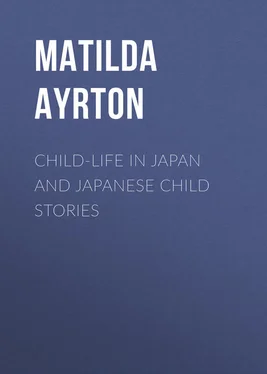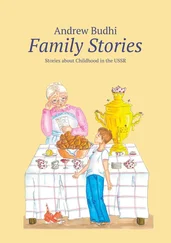Matilda Ayrton - Child-Life in Japan and Japanese Child Stories
Здесь есть возможность читать онлайн «Matilda Ayrton - Child-Life in Japan and Japanese Child Stories» — ознакомительный отрывок электронной книги совершенно бесплатно, а после прочтения отрывка купить полную версию. В некоторых случаях можно слушать аудио, скачать через торрент в формате fb2 и присутствует краткое содержание. ISBN: , Жанр: foreign_antique, foreign_prose, на английском языке. Описание произведения, (предисловие) а так же отзывы посетителей доступны на портале библиотеки ЛибКат.
- Название:Child-Life in Japan and Japanese Child Stories
- Автор:
- Жанр:
- Год:неизвестен
- ISBN:http://www.gutenberg.org/ebooks/28979
- Рейтинг книги:5 / 5. Голосов: 1
-
Избранное:Добавить в избранное
- Отзывы:
-
Ваша оценка:
- 100
- 1
- 2
- 3
- 4
- 5
Child-Life in Japan and Japanese Child Stories: краткое содержание, описание и аннотация
Предлагаем к чтению аннотацию, описание, краткое содержание или предисловие (зависит от того, что написал сам автор книги «Child-Life in Japan and Japanese Child Stories»). Если вы не нашли необходимую информацию о книге — напишите в комментариях, мы постараемся отыскать её.
Child-Life in Japan and Japanese Child Stories — читать онлайн ознакомительный отрывок
Ниже представлен текст книги, разбитый по страницам. Система сохранения места последней прочитанной страницы, позволяет с удобством читать онлайн бесплатно книгу «Child-Life in Japan and Japanese Child Stories», без необходимости каждый раз заново искать на чём Вы остановились. Поставьте закладку, и сможете в любой момент перейти на страницу, на которой закончили чтение.
Интервал:
Закладка:
In the neighborhood in which the children shown in the picture live, there is a temple. In honor of the god a feast-day is held on the tenth of every month. The tenth day of the tenth month is a yet greater feast-day. On these days they go the first thing in the morning to the barber's, have their heads shaved and dressed, and their faces powdered with white, and their lips and cheeks painted pink. They wear their best clothes and smartest sashes. Then they clatter off on their wooden clogs to the temple and buy two little rice-cakes at the gates. Next they come to two large, comical bronze dogs sitting on stands, one on each side of the path. They reach up and gently rub the dog's nose, then rub their own noses, rub the dog's eyes, and then their own, and so on, until they have touched the dog's and their own body all over. This is their way of praying for good health. They also add another to the number of little rags that have been hung by each visitor about the dog's neck. Then they go to the altar and give their cakes to a boy belonging to the temple. In exchange he presents them with one rice-cake which has been blessed. They ring a round brass bell to call their god's attention, and throw him some money into a grated box as big as a child's crib. Then they squat down and pray to be good little boys. Now they go out and amuse themselves by looking at all the stalls of toys and cakes, and flowers and fish.
The man who sells the gold-fish, with fan-like tails as long as their bodies, has also turtles. These boys at last settle that of all the pretty things they have seen they would best like to spend their money on a young turtle. For their pet rabbits and mice died, but turtles, they say, are painted on fans and screens and boxes because turtles live for ten thousand years. Even the noble white crane is said to live no more than a thousand years. In this picture they have carried home the turtle and are much amused at the funny way it walks and peeps its head in and out from under its shell.
FIRST MONTH
Little Good Boy had just finished eating the last of five rice cakes called "dango," that had been strung on a skewer of bamboo and dipped in soy sauce, when he said to his little sister, called Chrysanthemum: —
"O-Kiku, it is soon the great festival of the New Year."
"What shall we do then?" asked little O-Kiku, not clearly remembering the festival of the previous year.
Thus questioned, Yoshi-san 4 4 Yoshi-san. Yoshi means good, excellent, and san is like our "Mr.," but is applied to any one from big man to baby. The girls are named after flowers, stars, or other pretty or useful objects.
had his desired opening to hold forth on the coming delights, and he replied: —
"Men will come the evening before the great feast-day and help Plum-blossom, our maid, to clean all the house with brush and broom. Others will set up the decoration in front of our honored gateway. They will dig two small holes and plant a gnarled, black-barked father-pine branch on the left, and the slighter reddish mother-pine branch on the right. They will then put with these the tall knotted stem of a bamboo, with its smooth, hard green leaves that chatter when the wind blows. Next they will take a grass rope, about as long as a tall man, fringed with grass, and decorated with zigzag strips of white paper. These, our noble father says, are meant for rude images of men offering themselves in homage to the august gods."
"Oh, yes! I have not forgotten," interrupts Chrysanthemum, "this cord is stretched from bamboo to bamboo; and Plum-blossom says the rope is to bar out the nasty two-toed, red, gray, and black demons, the badgers, the foxes, and other evil spirits from crossing our threshold. But I think it is the next part of the arch which is the prettiest, the whole bunch of things they tie in the middle of the rope. There is the crooked-back lobster, like a bowed old man, with all around the camellia branches, whose young leaves bud before the old leaves fall. There are pretty fern leaves shooting forth in pairs, and deep down between them the little baby fern-leaf. There is the bitter yellow orange, whose name, you know, means 'many parents and children.' The name of the black piece of charcoal is a pun on our homestead."
"But best of all," says Yoshi-san, "I like the seaweed hontawara, for it tells me of our brave Queen Jingu Kogo, who, lest the troops should be discouraged, concealed from the army that her husband the king had died, put on armor, and led the great campaign against Korea. 5 5 The campaign against Korea : 200 A.D.
Конец ознакомительного фрагмента.
Текст предоставлен ООО «ЛитРес».
Прочитайте эту книгу целиком, купив полную легальную версию на ЛитРес.
Безопасно оплатить книгу можно банковской картой Visa, MasterCard, Maestro, со счета мобильного телефона, с платежного терминала, в салоне МТС или Связной, через PayPal, WebMoney, Яндекс.Деньги, QIWI Кошелек, бонусными картами или другим удобным Вам способом.
1
Fuji San , or Fuji no Yama, the highest mountain in the Japanese archipelago, is in the province of Suruga, sixty miles west of Tokio. Its crest is covered with snow most of the year. Twenty thousand pilgrims visit it annually. Its name may mean Not Two (such), or Peerless.
2
Arima was one of the daimios or landed nobleman, nearly three hundred in number, out of whom has been formed the new nobility of Japan, a certain number of which are in the Upper House of the Imperial Diet.
3
Wild-dogs: ownerless dogs have now been exterminated, and every dog in Japan is owned, licensed, taxed, or else liable to go the way of the old wolfish-looking curs. The pet spaniel-like dogs are called chin .
4
Yoshi-san. Yoshi means good, excellent, and san is like our "Mr.," but is applied to any one from big man to baby. The girls are named after flowers, stars, or other pretty or useful objects.
5
The campaign against Korea : 200 A.D.
Интервал:
Закладка:
Похожие книги на «Child-Life in Japan and Japanese Child Stories»
Представляем Вашему вниманию похожие книги на «Child-Life in Japan and Japanese Child Stories» списком для выбора. Мы отобрали схожую по названию и смыслу литературу в надежде предоставить читателям больше вариантов отыскать новые, интересные, ещё непрочитанные произведения.
Обсуждение, отзывы о книге «Child-Life in Japan and Japanese Child Stories» и просто собственные мнения читателей. Оставьте ваши комментарии, напишите, что Вы думаете о произведении, его смысле или главных героях. Укажите что конкретно понравилось, а что нет, и почему Вы так считаете.












